Migrants voices of Leeds: A day of information, engagement and action
The event “Migrants voices of Leeds: A day of information, engagement and action” was held on the 7th July 2017 at the Cockburn Centre in Beeston, Leeds. The event co-organised by colleagues from the University of Leeds Migration Research Network (Gabriella Alberti, Chris Forde and Louise Waite) and the Migrant Community Networkers from the Migrant Access Project[1] (MAP). The event was the outcome of months of conversations with members of the diverse migrant communities of Leeds active in the MAP. The event was funded by the Impact Acceleration Account through the Leeds Social Sciences Institute of the University of Leeds, under the project title: Migration, equality and social cohesion: promoting inter-community dialogue in times of change (PI Gabriella Alberti), in partnership with the Leeds City Council. The series of listening laboratories that preceded the event have been carried out between March and May 2017 to map out the needs, issues and horizons of the dozens of members from the different national, ethnic or language backgrounds involved in MAP.
The event comprised a mix of parallel sessions including workshops, short talks, skills sharing, information provision, and opportunities to voice the needs of migrant residents with institutional actors. Informative and skills sharing sessions were organised on a range of topics as diverse as Housing, Employment and Employability, Immigration and Residency Rights, Welfare Benefits, Education and Access to Higher Education that saw the active participation of the migrant community networkers and members of their communities.
The initiative has been very successful with more than hundred participants attending throughout the day, coming from a diverse range of communities and constituencies in and around Leeds, including migrants, service providers, city councillors, NGOs, academics and interested residents attending and participating the workshops and discussions. Among the most important objectives achieved though the initiative there were: active learning about rights and entitlements through the Q&A sessions with experts, linking up between different service users and government representatives (Welfare benefits session), networking between academics and third sector, bridging of knowledge gaps between different front desk providers and government agencies; the opening up of dialogue and mutual listening between “old and new” migrant residents in Leeds; and especially the opportunity for the MCNs to voice their concern directly with local politicians.
……
Some key initiatives and snapshots from the day:
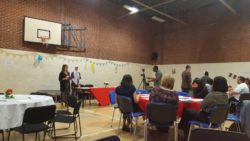
Opening session
The day was opened with introductory speeches from the organisers and a testimonial by Karmel from the Syrian community in Leeds, about her experience of volunteering and working with other communities through MAP. Chief Officer Communities, Communities and Environment and Councillors from Leeds City Council also shared his views on strengthening communities, access to services and wellbeing, celebrating diversity and Leeds as city of sanctuary.
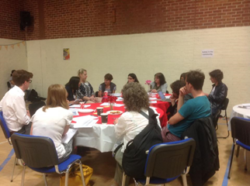
Session on Residency rights and Brexit
Special sessions and roundtables were held during the day with expert guests from Leeds and across the country. In particular a workshop on residency rights and Brexit, with immigration solicitors and the high profile representative of the 3 Million campaign Anne-Laure Donskoy, who while acknowledging the persistence of uncertainty, both helped to clarify the implications of recent developments in the field of free movement, residence and benefit rights for EU nationals and possible legal implications followed by a lively Q&A session (click here for the 3 Million’s recently published PRC-Report on the challenges to apply for the Permanent Residence Certificate). The 2nd session was led by Sharon Panepinto from Hope not Hate, who provided a wealth of information, literature material and case studies about the challenges of obtaining habitual residence for EU migrants in the UK, including issues related to family reunion, and the complexities of proving entitlement to for those working on the margins of the labour market.
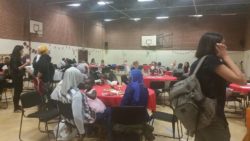
networking session
Charlotte Peel, Joint Council for the Welfare of Migrants, was invited from London to speak as part of the Housing session on The Right to Rent legislation and implications for migrants, with participants from the migrant community as well as campaigners and service providers involved in the housing rights front locally such as Hand Off Our Homes. Other special sessions involved the agency Path Yorkshire, Preparing communities for the world of work, which provided key information about training opportunity and employability to new arrivals. As part of the Education session the Careers Education and Guidance Officer Lifelong Learning Centre gave instead an overview of the steps to access University education for aspiring non-citizen students in Leeds.
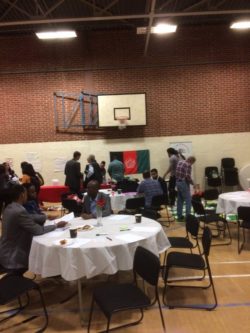
networking session
The afternoon session on Welfare Benefits and Migration was led by Simon Betts, Relationship Manager, Department for Work & Pensions, Work Service Directorate, Leeds Southern House Jobcentre, who gave a very comprehensive overview of Welfare changes in & supporting those customers in receipt of Employment Support Allowance. The challenges for migrants in terms of entitlement to benefits as non-citizens and the upcoming changes under Universal Credit were discussed and many questions from the floor raised by those attending. Rosa Mas Giralt from the University of Leeds and co-founder of LMRN, reported on her research exploring Barriers to migrants accessing public services and welfare: a case study on Latin Americans in the UK while Michaela, MAP, Slovakian self-help group, Benefit claimants support.
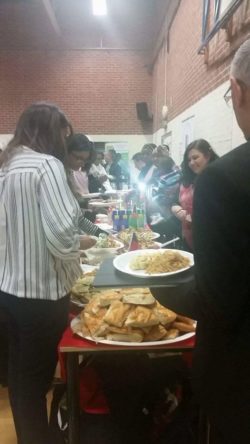
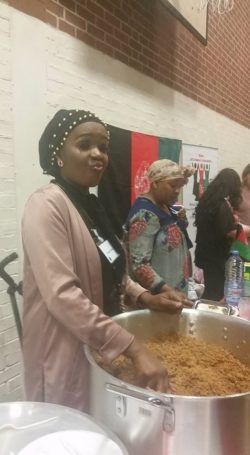 The migrant community networkers have been key in the organisation and planning of the event and overall it has been a very important experience of co-production between academics, the third sector, the local government, and new and longer-term residents of Leeds. The international hot food prepared with great care and effort by MCNs from the Roma Cafe and Bahar Women among others was just delicious!
The migrant community networkers have been key in the organisation and planning of the event and overall it has been a very important experience of co-production between academics, the third sector, the local government, and new and longer-term residents of Leeds. The international hot food prepared with great care and effort by MCNs from the Roma Cafe and Bahar Women among others was just delicious!
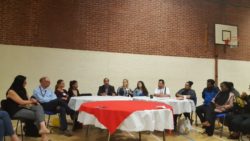
final plenary with Councillor Javid Akhtar
The day was concluded with a final Migrant Voices Plenary session, , an opportunity to report key issues emerged from the different workshops and engage in open dialogue with representatives from the City and other migrant support organizations like RETAS, partner and supporter of the UoL bid together with Hope not Hate. Hyde Park constituency Councilor Javid Akhtar offered his thoughts about the need to celebrate the contribution of old and new migrants to the city and the importance of keeping alive the history of the different migrant communities that have made Leeds what it is today, a bubbling city with many social challenges but also a wealth of solidarity.
[1] The Leeds Migrant Access Project led by Pria Bhabra Commissioning Officer has been developed by Leeds City Council to help provide a living human map of new communities in Leeds, which can help new arrivals about life in Leeds. The migrant community networkers are trained through the MAP to help spread important messages to their communities that help integration and active citizenship.
